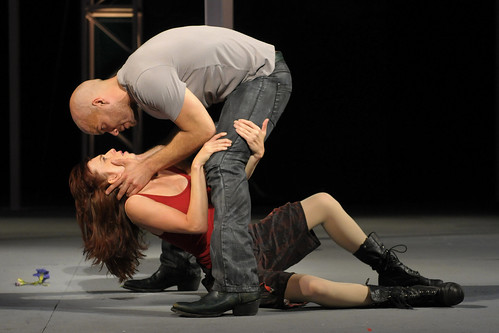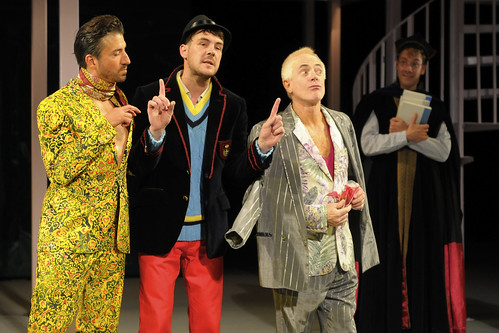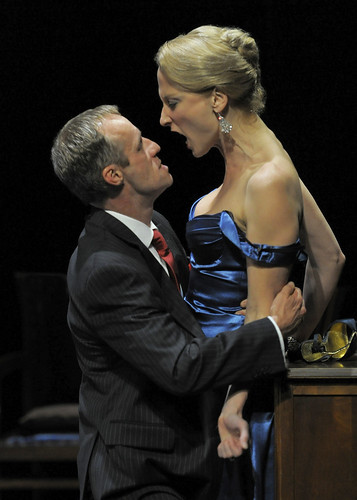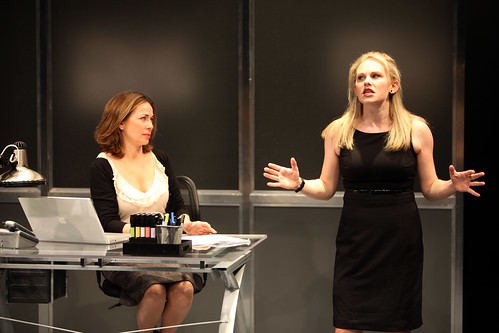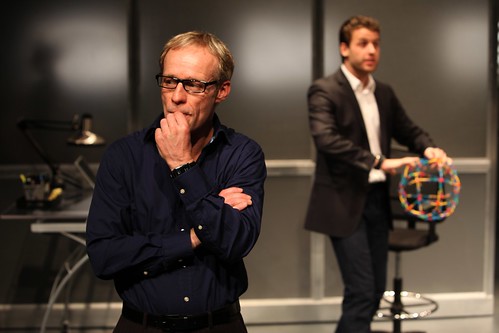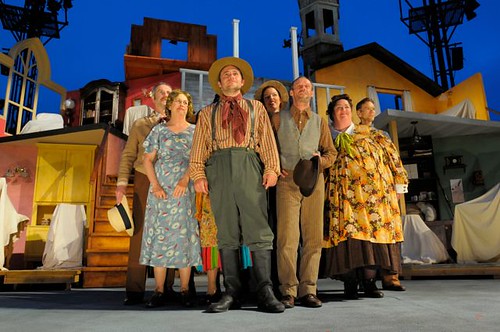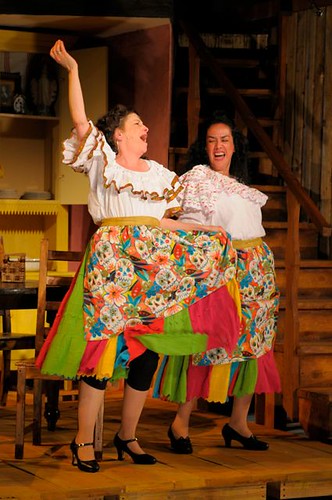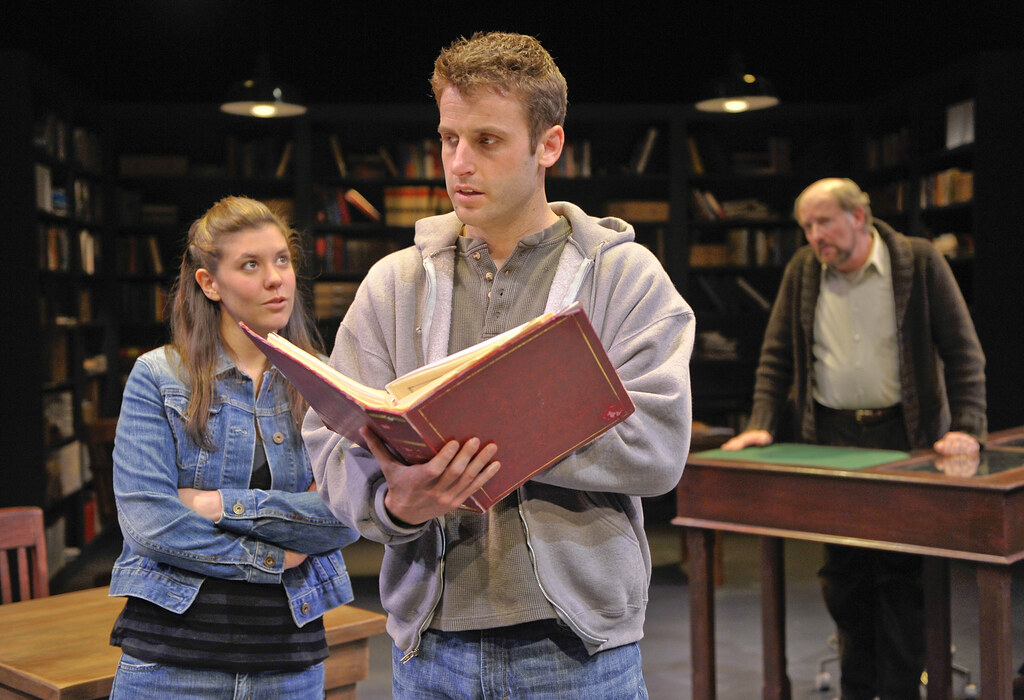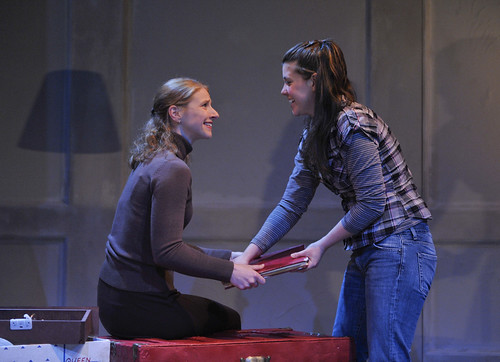Kissed and cursed: Erica Sullivan is Katherine and Slate Holmgren is Petruchio in the California Shakespeare Theater production of The Taming of the Shrew. Below: The excellent supporting cast includes (from left) Liam Vincent, Dan Clegg, Danny Scheie and Nicholas Pelczar as suitors to the lovely Bianca. Photos by Kevin Berne.Photos by Kevin Berne
If you think you’ve seen The Taming of the Shrew, you might want to think again. Director Shana Cooper’s production – the season-closer for the California Shakespeare Theater – is fresh, feisty and full of insight. Many a Shrew can make you cringe, but very few, like this one, can actually make you lose yourself in the comedy, the provocation and the genuine emotion underneath it all.
Cooper brings a sense of contemporary flash and fun to the production, from the bright yellow accents in Scott Dougan’s double-decker set (backed by a colorful billboard-like ad for a product called “Tame”) to the zippy song mash-ups in the sound design by Jake Rodriguez. The music is especially fun. You can hear strains of Madonna’s “Material Girl” followed by a flash of the “Wonder Woman” theme song one minute and revel in almost an entire number (“Tom, Dick or Harry”) from Kiss Me Kate, the next. In this tale of love that is purchased, battled over and maybe even deeply felt, the song “Will You Love Me Tomorrow” takes on intriguing textures, both comic and dramatic. Even the lighting by York Kennedy has a crystal-clear energy all its own.
The real miracle of Cooper’s production is that there are interesting characters in it other than feral lovers Kate (Erica Sullivan) and Petruchio (Slate Holmgren). Credit this to successful direction and a superb cast full of some of the Bay Area’s most versatile comedians. Of particular note are the suitors to Kate’s beauty queen little sister, Bianca (Alexandra Henrikson): the tailor Gremio (Danny Scheie), dapper dan Hortensio (Liam Vincent) and intellectual Lucentio (Nicholas Pelczar). When the action shifts away from the central taming story, it doesn’t feel like we’re just biding time until we get back. Even the servants – Dan Clegg as Tranio, Dan Hiatt as Grumio, Joan Mankin in a trio of nicely etched roles – feel richer than usual. Rod Gnapp in the thankless role of Kate and Bianca’s father, even emerges more fully fleshed out than usual.
Scheie, as usual, gets away with comic murder. Even the way he says the name of his beloved, Bee-ANK-uh, gets a laugh to say nothing of what he does with the phrase “turkey cushions.” Pelczar, Clegg and Theo Black as Biondello have an inspired bit of shtick in the first act involving the exchange of hats. The Marx Brothers would be proud. Almost as good is the timing of Clegg and Pelczar exchanging clothes, undressed to their matching skivvies for the line beginning, “In brief…”
There are so many wonderful details in this production that its 2 1/2 hours zip by. When Petruchio is late for his wedding, a description of his wild attire precedes his arrival, building up certain expectations that costumer Katherine O’Neill more than meets when he actually steps on stage. The outfit should be savored as a surprise, but let’s just say that amid the Saran Wrap there’s a starring role for Holmgren’s left butt cheek. Hilarious.
There is particular satisfaction in the richness of the Kate and Petruchio scenes. Their first scene together, which received a well-earned round of applause at Saturday’s autumnally temperate opening-night performance, is a prolonged seduction as much as it is an intense fight. Cooper, with the help of movement coach Erika Chong Shuch and fight director Dave Maier, turns it into a memorably acrobatic dance that infuses every line of dialogue with meaning. And it’s sexy as hell, thanks to Sullivan and Holmgren’s expert execution.
The trajectory of Kate and Petruchio’s love story – and that’s really what it is here – is clear from the first time they see each other, and each, almost in spite of themselves, likes what they see. Sullivan and Holmgren have red-hot chemistry from the very first, and they’re so good together you really do want them together. Kate’s got emotional troubles and Petruchio’s actually terrified by her, a state incompatible with his alpha-male bravado. But they both dive in, each a little crazed and carried away until they reach an understanding about how deeply they are willing to invest in their union and in each other. The taming here is mutual, and in the end it isn’t taming so much as maturing. Theirs will not be a shallow marriage of arrangement, though that’s how it begins. Unlike Bianca’s meet-cute relationship with her groom, Kate and Petruchio will likely still love on another tomorrow.
[bonus interview]
I interviewed director Shana Cooper and Cal Shakes Artistic Director Jonathan Moscone for a feature in the San Francisco Chronicle. Read the story here.
FOR MORE INFORMATION
California Shakespeare Theater’s The Taming of the Shrew continues through Oct. 16 at the Bruns Amphitheater, 100 California Shakespeare Theater Way, Orinda (one mile east of the Caldecott Tunnel on Highway 24). Free shuttle to and from the Orinda BART station and the theater. Tickets are $35-$66. Call 510-548-9666 or visit www.calshakes.org.

